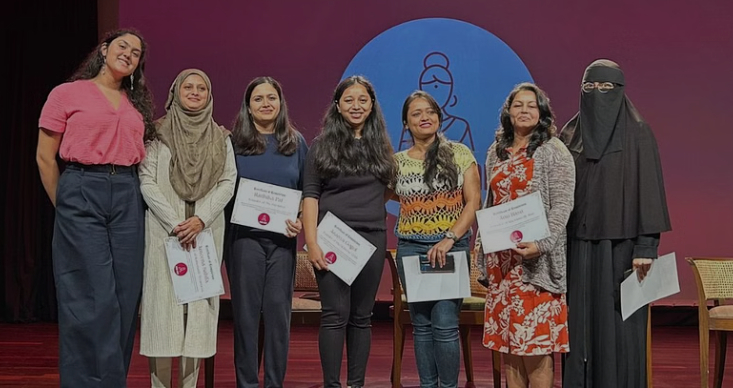Maanya Singh, a Class 11 student, started Incuba-Naari in 2020 to financially empower women by incubating their small business ventures and also telling their stories for impact.
Maanya Singh did not have to look far when it came to women and entrepreneurship. She found inspiration at home, in her mother who had quit her corporate job when she and her brother were little.
Not one to sit idle, she started pottery as a hobby and transformed it into a full-fledged business.
“Witnessing the entire journey first-hand, from watching my mother make pots in our garage to having her studio, and seeing the impact on her self-esteem led me to understand the role financial independence plays in empowering women,” Maanya tells.
The Class 11 student at Indus International School, Bengaluru, recollects conversations with her father on how her great-grandmother was forced into marriage as a child for financial security. Everyday conversations with domestic help also made her understand the larger problem.
“I was able to understand that they were trapped in abusive relationships for a long time and weren’t able to leave because they didn’t have the safety net of economic security,” Maanya says.
It became clear to her that the biggest and unaddressed contributor to gender inequality is a lack of financial independence in women.
At the same time, Maanya says she was also observing a silent revolution of women creating small businesses.
“When a woman starts a business, she ensures her financial independence. It also creates a sustainable ripple effect on the community when the business grows and employs other women,” she adds.
Maanya started Incuba-Naari in 2020 to help more women entrepreneurs join the ecosystem by understanding their challenges and what can be done to empower them in diverse ways.
Before starting Incuba-Naari, Maanya interviewed 40 women entrepreneurs across India and found the experience insightful and interesting.
“Through the study, I was able to demonstrate that entrepreneurship does result in a statistically significant increase in women’s financial independence and social empowerment. Our data revealed that 95% of business owners aspire to scale but different factors hinder the process. They also don’t have access to mentorship, networking, digital amplification, and so much more,” she explains.
Maanya posted 40 stories about these women on Incuba-Naari’s Instagram account for better reach.
In 2022, she applied for the Dr Siva Kumari MYP Student Innovators’ Grant, a scholarship offered by the International Baccalaureate in association with Ashoka Foundation for Social Entrepreneurship, to support students in social impact. She, along with 30 projects internationally, was awarded $8,000, which helped her bring Incuba-Naari to life.
Amplifying stories
As part of Incuba-Naari’s Small Business Programme, women entrepreneurs will be mentored through a three-month programme, followed by a two-day physical event in Bengaluru, where they will receive the opportunity to launch their products. The non-profit plans to launch one cohort every quarter.
The first cohort includes nine women entrepreneurs who were provided mentorship and training by a team of experts and mentors like Kavita Mohammad, Co-founder of Wonderhood, and Saroja Yeramalli, CEO and Founder of Melorra. The topics included branding, digital marketing, financial literacy, and social media management.
Other industry stalwarts like Sabari Ayyappan, CRO of Dynamite XDT, and Shibanee Sagar, Co-founder of Total Environment, are also part of the cohort. A “student squad” helps these women entrepreneurs navigate the programme.
The cohort, which began in September, will culminate in a business exhibition at Bangalore International Centre on December 17-18.
“For our business event, we are working on a partnership with Etsy India to help women set up their products on marketplaces,” she says.
Women entrepreneurs are selected from Incuba-Naari’s online community based on their commitment to the programme and their focus on paying it forward to other women once they scale.
The cohort includes Ameena Sahifa, Founder of Homemade Treasures, which specialises in creating miniature food sculptures. Ameena, from Madikeri in Coorg, started her business during the pandemic and has expanded her business online.
“Incuba-Naari has helped me get great exposure and seize opportunities to create awareness and promote my business. I look forward to explaining the creativity in my work and receiving the attention of my target audience to enhance my career,” she says.
The programme will also connect women entrepreneurs to venture capitalists to seek funding. Besides this, all their stories, written by student journalists, are amplified on the Incuba-Naari website.
“We have three metrics to measure how successful this programme is. How important is financial independence for the entrepreneur? We will be looking at the impact in terms of numbers over six months and whether it has seen a measurable difference. The third metric is all about creating a ripple effect,” she says.
Maanya’s goal is to empower 100 women entrepreneurs by December 2023, who will then end up employing more women and creating a real impact on the quality of life of women across India.
The teenager is thankful for the support from the Startup U entrepreneurship programme and her school for helping Incuba-Naari grow from the ideation stage to reality. Maanya works with a board of mentors, and fellow students Tashvi Narang and Anushka Purkayashtha.
How does she balance academics and her non-profit?
“I have a lot of support from my school, family, and also bank on the Jewish concept of tikkun alam, which refers to various forms of action intended to repair or improve the world. In school, we dedicate two hours a week to this and ultimately it all comes down to time management and prioritisation,” Maanya says.











